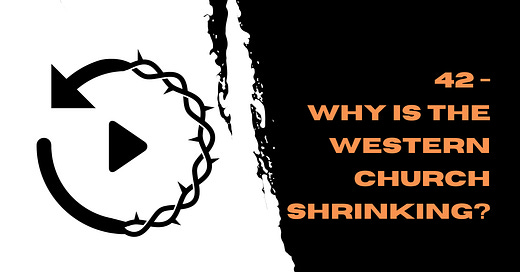There are a dozen ways to answer a question like this–many of them correct, many more incorrect, and none of them comprehensive. Especially within a ten-minute delivery limit (I steer towards five if I can), there simply isn’t enough time to discuss all the sociological themes at play. There are many books written about it for those craving all the knowledge. Is it postmodernism? Is it social media’s influence? Is it the new generation? Everyone has a culprit to blame, but what if the blame belongs to the Christians?
They say (whoever they are) that those who do not know their history are doomed to repeat it. Some of history’s greatest figures were indeed historians themselves who knew which way to pave forward instead of repeating well-trodden arcs. Specifically, within a bible-centered perspective, I suggest we look at our failing Western church through a historical lens–a biblical historical lens–to draw conclusions and even solace in ways that our survey statisticians and modern philosophers simply cannot. So, let’s try that.
At the height of ancient Israel’s power, “King Solomon was greater in riches and wisdom than all the other kings of the earth.” (2 Chronicles 9:22, NIV) Kings sought his audience and offered him gifts of weaponry and fine metals for it. His throne was completely overlaid with ivory and gold. His was “the good life.” It would appear to any observer that God had fully delivered on His Abrahamic promises.
30 years later, God’s chosen nation is divided into two. In eight more generations, both were conquered, and Solomon’s majestic temple to God was ransacked and ruined. Not so good anymore.
How did it all fall apart so quickly? Historians will discuss the ascendency of the global empires, as Assyria gave way to the Babylonians, who gave way to the Persians, with ultimate influences of Greek and Roman conquests. Anthropologists may cite the further development and defense of nations over city-states, the rise of Greek philosophy, or the influence of Eastern ethos on Mediterranean cultures. But make no mistake–the ancient Israelites brought catastrophe upon themselves.
Secularly, a nation divided and warring with its former brothers is much more vulnerable than one united. Religiously, the Bible records the people’s continual descent into sin and error, inviting God’s wrath. No matter how you slice it, the people of Israel sealed their own fate.
Perhaps the Western church has done the same. Both ancient Israel and the modern Western church (MWC) had lost their divinely appointed purpose as they leaned into behaviors of the surrounding cultures instead of being the antidote. Both ancient Israel and the MWC ascended to prestige, wealth, and influence on the back of God’s Word, only to opt for more through political means. Ancient Israel and the MWC were plagued by poor leadership that was particularly overcome by sin, whether it be Ahab and Jezebel of antiquity or the terrible sexual exploitation of children and church staff we read so frequently about. Israel and the MWC both gave up their God-given identities for political and secular indulgences. When this happened, the world saw them for what they truly were–vulnerable humans no longer protected by the grace of their God.
But in God’s plan, there’s always a remnant. When Elijah is despondent about being God’s only faithful servant left, God replies, “Yet I reserve seven thousand in Israel—all whose knees have not bowed down to Baal” (1 Kings 19:18, NIV) When the ancient Hebrews were more fearful of the Canaanites than trusting in the Lord, two men–Joshua and Caleb–remained faithful (Numbers 14). As the world’s leaders bowed to a golden image of Nebuchadnezzar, Hananiah, Mishael, and Azariah remained standing (Daniel 3). When the odds are stacked against God’s elect, He strengthens the few.
At the height of Solomon’s earthly glory, he alone had 12,000 horses at his command (2 Chronicles 9:25). 422 years later, when the Jewish people returned to rebuild the temple, the entire population only had “736 horses, 245 mules, 435 camels, and 6,720 donkeys.” (Ezra 2:66-67, NIV) Israel had ascended to power like a flash in the pan, only to be decimated through war, famine, and exile.
Yet, a remnant remained.
This is our history. Jewish history is Christian history, up until a point (Jesus). The MWC is repeating that history. It has enjoyed the height of its secular fame and political power but now sees its numbers decline and its median age rise as it offers no salt to those lost in the muck and mire that is our culture. As the Assyrians and Babylonians dismantled all that the ancient Israelites secularly leaned upon, today’s culture has now similarly turned its ire on the church for its hypocrisies, moral failings, and pursuit of power. God, as He has historically done, allowed the MWC to chase the fleeting winds of power to its own demise.
Sure, this message does not break down all the philosophical trends of modern man to understand how an ancient religion no longer jives with current luxuries and choice, but those studies squarely focus on the MWC while ignoring the growth of Christianity in the global south. Yes, there are many socioeconomic differences between Western standards of living and 2nd-world countries, but the Father, the Son, the Spirit, and the faith are all the same. They grow in one place while the MWC stumbles in decline. Maybe the fault isn’t with the faith–maybe it is with the faithless.
This message reveals our repeating role in our faith’s troubles. The MWC has not read the Bible as it should, meaning it does not know its history. The MWC has chased legislated morality through elections over personal piety. The MWC is afraid to speak of sin because it measures itself by the worldly standards of property size and attention through attendance. Instead, if the MWC “will humble themselves and pray and seek [God’s] face, then will [He] hear from heaven and forgive [our] sin and heal [our] land.” (2 Chronicles 7:14, NIV, adaptation mine). God spoke these words to Solomon at the height of Israel’s fame and power. It’s almost as if God knew where they–where we–would one day end up.
All it takes is a remnant. It can begin with us right now through prayer, fasting, reading, and seeking. Yes, for us Western Christians, we appear to be losing the culture war as postmodernism rips our children’s identities away, and numbers of our brethren ride the coattails of a political despot. The numbers are overwhelmingly against us, yet God’s power is made perfect in our weakness (2 Corinthians 12:9). Like Paul, let us rejoice in our weakness as we wait for God to rebuild His church through our true deep faith. If we hold up our end of the bargain, He’s promised both Solomon and us that He will keep His. He knows our history, yet He’s merciful enough to repeat His.













Share this post